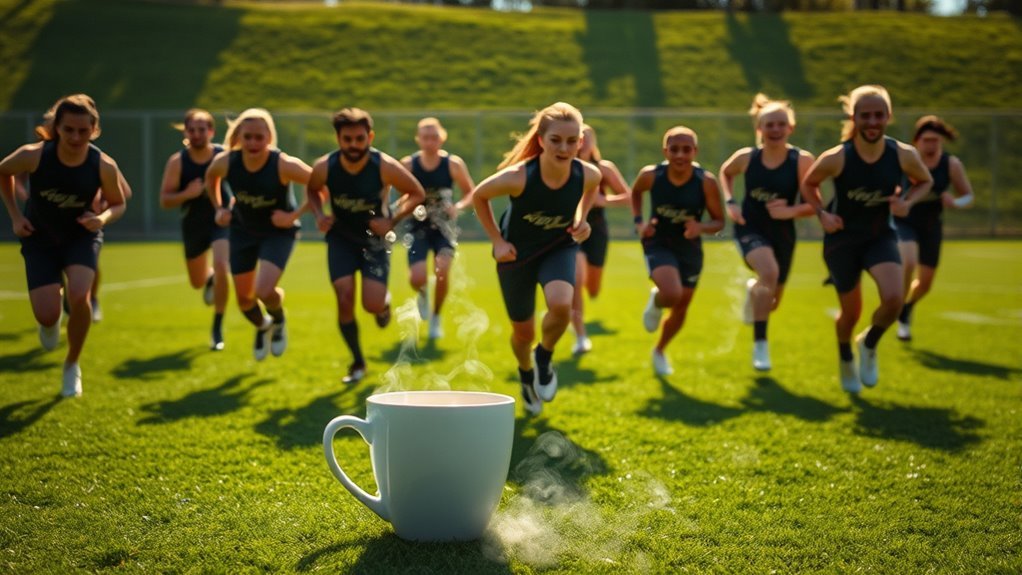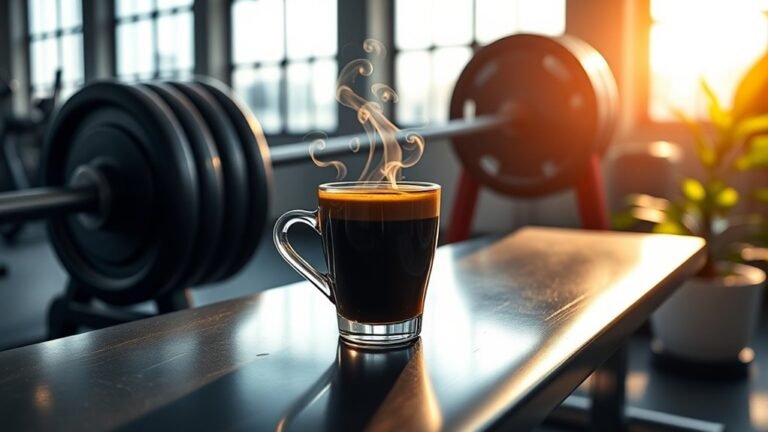The Benefits of Coffee for Team Sports
Coffee can greatly enhance your performance in team sports by improving focus, reaction times, and stamina. Caffeine boosts energy levels and reduces perceived muscle pain, allowing you to push through tough workouts. It also promotes mental resilience and helps alleviate stress, which can elevate team dynamics through shared coffee rituals. By establishing routines around coffee breaks, you can strengthen bonds with teammates and enhance overall collaboration. There’s so much more to explore about coffee’s impact on your game.
Enhanced Focus and Concentration

When you’re gearing up for a team sport, the ability to maintain focus and concentration can make all the difference in your performance. Consuming coffee before a game can greatly enhance your cognitive performance. The caffeine in coffee acts as a stimulant, improving your mental clarity and helping you stay alert. This heightened state allows you to process information more quickly, make better decisions, and react appropriately to dynamic situations on the field. By increasing dopamine levels, coffee can also elevate your mood, further contributing to your focus. However, moderation is key; too much caffeine may lead to jitters or anxiety. Embracing the right amount of coffee can unleash your potential, allowing you to perform at your best when it matters most.
Improved Reaction Times
When you consume coffee, its caffeine content can greatly enhance your focus and alertness, allowing you to stay sharp during intense gameplay. This increased energy level also plays an essential role in improving your reaction times, helping you respond more quickly to fast-paced actions on the field. As a result, you may find that your performance in team sports becomes more dynamic and effective.
Enhanced Focus and Alertness
Although many athletes focus on physical training, enhanced focus and alertness can greatly improve performance in team sports, particularly through better reaction times. Coffee, known for its stimulating effects, plays a significant role in boosting cognitive performance and mental clarity. Here’s how it can help you:
- Increases dopamine levels, enhancing mood and motivation
- Improves visual attention, aiding in quicker decision-making
- Sharpens concentration, reducing distractions during gameplay
- Facilitates faster processing of information, essential in fast-paced sports
- Heightens alertness, allowing for quicker reflexes
Increased Energy Levels
Coffee’s ability to increase energy levels can greatly enhance your reaction times during team sports. Improved reaction times are essential for making quick decisions and executing plays effectively. Caffeine consumption stimulates your central nervous system, leading to higher alertness and faster responses. This can greatly boost team motivation, as energized players are more likely to perform well and inspire each other.
| Caffeine Consumption | Reaction Times | Team Motivation |
|---|---|---|
| Low | Slower | Low |
| Moderate | Moderate | Moderate |
| High | Faster | High |
| Very High | Fastest | Very High |
| No Caffeine | Slow | Low |
Incorporating coffee before games could give you the competitive edge you need!
Increased Stamina and Endurance

As athletes seek ways to enhance their performance, increased stamina and endurance become essential factors in team sports. Coffee can play a significant role in this aspect, especially when paired with effective carbohydrate loading and hydration strategies. Here’s how coffee can help you:
- Boosts energy levels for extended play
- Increases fat oxidation, sparing glycogen stores
- Enhances focus and concentration during games
- Improves reaction times and overall speed
- Supports prolonged training sessions without fatigue
Incorporating coffee into your routine can help you push through those challenging moments on the field. Just remember to balance your caffeine intake with adequate hydration to maximize its benefits and maintain performance. Enjoy your game, and let coffee fuel your journey toward greater stamina!
Reduced Muscle Pain and Discomfort
After experiencing increased stamina and endurance, athletes often face the challenge of muscle pain and discomfort. Coffee can play an essential role in pain management and muscle recovery following intense workouts. The caffeine in coffee has been shown to reduce perceived muscle pain, allowing you to push through those challenging sessions with greater ease. This effect can lead to quicker recovery times, enabling you to return to training sooner and with less discomfort. By incorporating coffee into your routine, you can leverage its analgesic properties to minimize soreness, and thereby enhance your overall performance. So, next time you’re gearing up for a workout, consider that cup of coffee as a strategic tool for reducing muscle pain and discomfort effectively.
Boosted Metabolism and Fat Oxidation

When you consume coffee, it can considerably enhance your metabolism and promote fat oxidation, leading to increased energy levels. This boost not only helps you feel more energized but also improves your endurance during team sports. By tapping into stored fat for fuel, you can enhance your overall performance on the field.
Enhanced Energy Levels
While you might enjoy your morning cup of coffee for its rich flavor, its benefits extend far beyond that, particularly for athletes involved in team sports. Coffee consumption can greatly enhance your energy levels, making you feel more energized and ready to perform. Here’s how it boosts your athletic performance:
- Increases adrenaline production
- Enhances fat oxidation for fuel
- Boosts metabolism, aiding weight management
- Improves focus and mental clarity
- Reduces perceived exertion during workouts
Improved Endurance Performance
As you engage in team sports, the ability to maintain endurance is essential, and coffee can play a significant role in enhancing your performance. Caffeine boosts metabolism, helping your body utilize fat as fuel more efficiently during extended activities. This enhanced fat oxidation can improve your endurance by prolonging glycogen stores, allowing you to perform better without feeling fatigued. For ideal results, combine your coffee intake with effective hydration strategies, ensuring you’re well-hydrated before and during your games. Additionally, consider your nutrition timing; consuming coffee about 30-60 minutes before your activity can maximize its benefits. So, embrace coffee as a tool to elevate your endurance and keep your energy levels consistent throughout your team sports endeavors.
Mental Resilience and Stress Reduction
Although mental resilience is often overlooked in team sports, coffee can play an essential role in enhancing focus and reducing stress levels among athletes. By consuming coffee, you may experience improvements in mental clarity and emotional balance, which are critical for performance under pressure. Here are some benefits of coffee related to mental resilience:
Coffee can enhance mental resilience in athletes by improving focus and reducing stress, crucial for peak performance.
- Increases alertness and concentration
- Reduces perceived exertion during intense training
- Alleviates feelings of anxiety and tension
- Supports mood stabilization
- Enhances cognitive function during games
Incorporating coffee into your routine can help you build mental resilience, making it easier to cope with challenges and setbacks on and off the field. Embracing this simple strategy could lead to better overall performance in your team sports endeavors.
Social and Team Bonding Benefits

Building mental resilience is just one aspect of how coffee can benefit athletes; it also fosters social connections and team bonding. These coffee breaks act as essential team rituals, creating opportunities for social interactions that deepen relationships. During pre-game gatherings, sharing a cup of coffee can lead to bonding experiences that enhance team cohesion. This caffeine camaraderie not only energizes players physically but also mentally prepares them for competition. By gathering over coffee, you’re cultivating an environment where team members feel valued and connected, which can translate into improved performance on the field. Embracing these moments can strengthen your team dynamic, making you more unified and resilient in the face of challenges. So, brew a pot and bond!
Frequently Asked Questions
How Much Coffee Should Athletes Consume Before a Game?
When considering how much coffee you should consume before a game, it’s essential to understand pre-game dosage and caffeine timing. A common recommendation is about 3-6 mg of caffeine per kilogram of body weight, consumed 30-60 minutes prior to your event. This timing maximizes energy and focus. Just remember, individual tolerance may vary, so it’s wise to experiment during training to find what works best for you without causing jitters.
Can Coffee Negatively Impact Hydration Levels in Athletes?
Coffee can complicate your hydration strategies, especially if you’re not mindful of your caffeine tolerance. While caffeine does have a mild diuretic effect, moderate consumption usually won’t lead to significant dehydration. If you’re relying on your morning brew, just balance it with ample water intake to stay hydrated. Remember, staying aware of your body’s needs is essential for peak performance, so listen to what your hydration levels are telling you.
Are There Any Side Effects of Coffee for Sports Performance?
When considering the side effects of coffee on sports performance, it’s important to think about your caffeine tolerance. Some athletes might experience jitters or increased performance anxiety, which can hinder their focus and effectiveness. Additionally, excessive caffeine can lead to dehydration, impacting endurance. It’s vital to find a balance that enhances your performance without pushing you past your limits. Monitoring your body’s response can help you optimize your coffee intake for the best results.
Is Decaffeinated Coffee Beneficial for Athletes?
Decaffeinated coffee can offer several benefits for athletes, particularly for those sensitive to caffeine or who prefer to limit their intake. You might find that decaf helps with hydration and provides antioxidants, contributing to overall health. Additionally, the familiar taste can enhance your routine without the jitters. While it won’t boost performance like regular coffee, its potential benefits align well with many athlete preferences for a balanced approach to nutrition and hydration.
What Time of Day Is Best to Drink Coffee for Sports?
The best time to drink coffee for sports largely depends on your needs. If you’re looking for a morning boost before your workout, consuming coffee about 30 minutes prior can enhance your performance. For afternoon focus, sipping coffee can help maintain your energy and concentration levels during training or competitions. Just remember to balance your intake to avoid jitters, and listen to your body to determine what works best for you.






